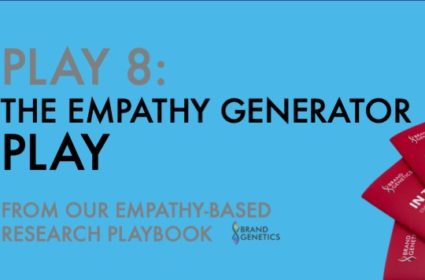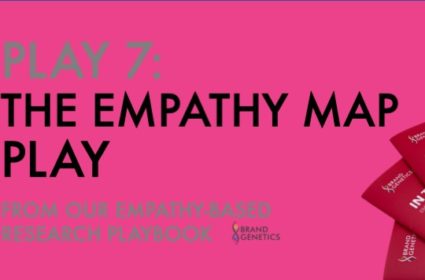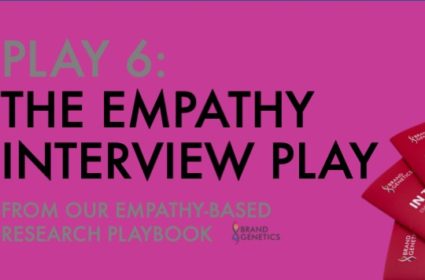Empathy stats and facts for business
10th October 2019
|
3 minute read

This article is part of our series on Empathy- based Research. You can view the full series or download the report.
At Brand Genetics, we use empathy as a technique to help clients make better decisions. Empathy is a mental ability that allows us to see the world from someone else’s perspective. This perspective-shifting ability can reveal issues and opportunities that may otherwise remain hidden.
As a mental ability, empathy is associated with many positive outcomes such as happiness, kindness, and relationship success. But what is the value of empathy in business? Here’s a list of useful empathy statistics illustrating the value of empathy in business.
- Empathy is #1 rule for “new product innovation success” according to a Nielsen analysis of 61,000 SKUs representing more than 12,000 new launches since 2011. 3 in 4 FMCG launches fail within a year. Those that succeed focus on “walking in the shoes of the consumer to uncover key demand-driven insights”.
- Empathy boosts business creativity. In a scientific experiment with 209 adults, a simple empathy exercise designed to activate empathy boosted the creativity of participants who were innovating a new line of new potato chips for pregnant women. Before beginning, some participants were asked to imagine how a consumer would feel using the product (empathy-inducing condition), whilst others were asked to imagine what the consumer would think when using the product (objective-imagination control condition). An independent jury found the ideas of the empathy-activated group were more original than the control group. Four other experiments confirmed the finding; whether it’s designing new toys, cereals or shopping carts, activating empathy boosts creativity. These experiments also showed that empathy can boost creativity by increasing our ‘cognitive flexibility’ (ability to see from and switch between multiple perspectives). This study confirmed previous findings that empathy is linked creativity (and inversely related to dogmatism)
- Empathy improves satisfaction. A Korean study in the healthcare sector found that empathy improves patient satisfaction and compliance (adhering to treatment schedule). Five hundred and fifty outpatients participated in the study. Physician empathy levels were linked to better information exchange, perceived expertise, interpersonal trust, and partnership. This resulted in higher patient satisfaction and better compliance.
- Empathy improves ability to negotiate. It might seem self-evident that the ability to see things from the other side of a negotiating table is beneficial in negotiations, but an INSEAD experiment by Adam Galinsky and colleagues validated this scientifically. 146 negotiators were profiled for the empathic ability of perspective-taking, and this was found to predict negotiation success. Across three negotiations, empathic perspective-taking was linked to negotiators’ ability to discover hidden agreements, to both create and claim resources at the negotiation table.
- Empathy is linked to good leadership. In studies by the Management Research Group, empathy was found to be the top competence for good leadership and one of the three strongest predictors of senior executive effectiveness. Similar results were found by 2016 CCL analysis of 6,731 leaders from 38 countries, where enhanced empathy was linked to superior performance. A recent DDI analysis of high performing leadership with 15,000 business leaders confirmed the same link between empathy and leadership performance. More worrying was the finding that empathy remains low in business leaders, with only 40% having proficient empathy skills.
- The empathy delusion in marketing. Marketing involves consumer closeness and understanding. But a 2019 study called The Empathy Delusion conducted by Reach found that marketers have no elevated ability to understand and empathise with consumers. 199 marketing executives completed an empathy psychometric test (the IRI – Interpersonal Reactivity Index) measuring their empathy levels both cognitively and emotionally. The study found no differences between marketers and the general population. Only 30% of marketers were proficient in experiencing the world from someone else’s (i.e. the consumer’s) perspective.
- The empathy deficit in business costs the average brand over $300m in lost revenue every year. This is the finding of a large-scale 2018 study by M&C Saatchi with 34,000 consumers across 225 large brands in China, US, UK and France. The study looked at people’s actual real-lived experience of brands, and whether it matched marketing promises made by the brand. They then assessed the consequences of any mismatch. The study found that 18% of consumers had stopped using a brand in the last 12 months because of the gap between marketing and experience, with 32% believe the gap is widening. Overall, this gap represents a fundamental empathy deficit among brands who are out of touch with what it feels like to use the brand.
- The empathy deficit and the 80:8 rule. Bain management consultants have identified a persistent empathy deficit in business characterised by the 80:8 rule. Across nearly 400 organisations. 80% of firms believed they deliver a superior experience to customers, whilst only 8% of their customers agreed.
- A lack of consumer-centricity costs brands 69 points in NPS (experience rating). In a 2017 global survey by Capgemini, 75% of brands audited believed they were consumer-centric, but only 30% of their consumers agreed. The study also found that brands perceived as not consumer-centric has an NPS experience rating 69 points lower than consumer-centric brands.
- Empathy levels may be falling. Our ability to empathise with others may be falling according a meta-analysis of US citizen empathy test scores conducted over the past 30 years. The study found that average American today is less empathic than 75% of Americans 30 years ago.
- Women are (usually) more empathic. Although empathy is an ability that can be improved with training, psychometric test norms tend to show that women typically have higher natural levels of empathy than men. For example, the 60-question EQ test measures ‘Empathy Quotient’ on a 0-80 scale with 80 being the most empathic possible. In a UK validation of the EQ with 1716 participants, women were found to have an average EQ of 48/80 (60%), and men 39/80 (49%), indicating that women are 11% more empathic than men. A shorter test EQ-Short found women scored 26/44 (59%) and men 20/44 (45%), indicating a similar discrepancy. An alternative empathy test (the TEQ – Toronto Empathy Questionnaire) also shows women can score more highly. Finally, women tend to outperform meant on a popular empathy test called the ‘Eyes Test’ (the full name is ‘Reading the Mind in the Eyes’) which tests people empathic ability to read emotions in peoples eyes. For example, in one recent validation of this test, women could correctly read 76% of emotions expressed through eyes, men 71%).
- Empathy is (partly) genetically determined. Like other personality traits, empathy is an ability that appears to be partly genetically determined. A study comparing empathy differences between twins and siblings found 52-57% of emotional empathy is due to genetics, compared to only 27% for cognitive empathy. Using the Empathy Eyes Test as a behavioural measure of cognitive empathy, and cross referencing this with the genetic profile of 88,056 23andMe customers, Cambridge University researchers have found an association between cognitive empathy in females and a genetic variation on chromosome 3 (3p26.1). A followup study using the EQ scale found that only about 10% of variation in overall empathy (emotional and cognitive) appears to be due to genetics. The study also found that women are on average more empathic than men, scoring an average of 50 (63%) vs 42 (53%) for men.
- Empathy develops over time. Less business focused but interesting nonetheless. Empathy grows with cognitive development. For example, children under four typically fail simple tests assessing their ability to understand something from someone else’s perspective (cognitive empathy). At four and above, children begin to pass these tests (e.g. the Sally-Anne test), indicating normal cognitive development (although sufferers from autism have difficulty with perspective-taking). Jean Piaget demonstrated this with the ‘Three Mountains Test‘ that involves matching photos taken from vantage points on a model of three mountains to the vantage points from which they were taken. At the age of four, children cannot de-centre their view, and typically fail this test. But by the age of 7 or 8 they usually pass, indicating normal cognitive development from egocentric thinking to acquiring a perspective-taking ability.




